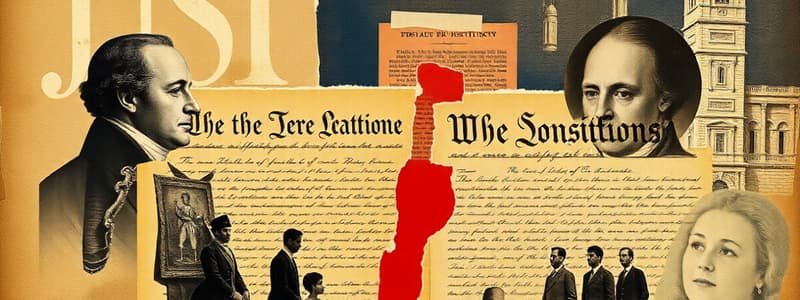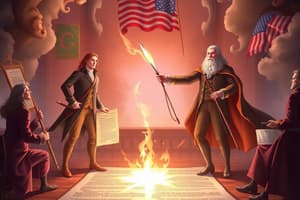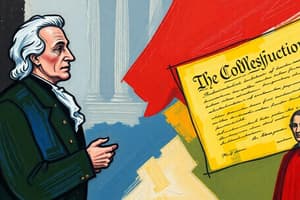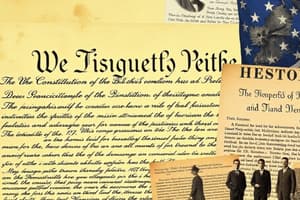Podcast
Questions and Answers
What was the primary reason the Federalists wanted to ratify the Constitution?
What was the primary reason the Federalists wanted to ratify the Constitution?
- To increase state powers
- To strengthen popular sovereignty
- To establish a strong national government (correct)
- To prevent the need for a Bill of Rights
Which group opposed the Constitution due to concerns about individual rights?
Which group opposed the Constitution due to concerns about individual rights?
- The Democratic-Republicans
- The Antifederalists (correct)
- The Nationalists
- The Federalists
What mechanism did the Framers use to ensure the Constitution's ratification?
What mechanism did the Framers use to ensure the Constitution's ratification?
- State legislatures voting on the Constitution
- Special conventions in each state (correct)
- Congressional approval
- Direct elections by citizens
What is the significance of The Federalist essays?
What is the significance of The Federalist essays?
Which Founding Father was NOT one of the authors of The Federalist?
Which Founding Father was NOT one of the authors of The Federalist?
What was a common concern among those who opposed a strong federal government?
What was a common concern among those who opposed a strong federal government?
How many states needed to ratify the Constitution for it to become law?
How many states needed to ratify the Constitution for it to become law?
What was one argument for the necessity of a Bill of Rights?
What was one argument for the necessity of a Bill of Rights?
What was a significant action taken by Washington after the war that influenced public perception of his leadership?
What was a significant action taken by Washington after the war that influenced public perception of his leadership?
Which of the following states ratified the Constitution first due to its relatively small size and benefits of a large federal structure?
Which of the following states ratified the Constitution first due to its relatively small size and benefits of a large federal structure?
What factor most significantly contributed to the ratification of the Constitution in states like Massachusetts, Virginia, and New York?
What factor most significantly contributed to the ratification of the Constitution in states like Massachusetts, Virginia, and New York?
Which amendment aimed at protecting citizens' rights was ultimately not ratified by the states in 1789?
Which amendment aimed at protecting citizens' rights was ultimately not ratified by the states in 1789?
How did Georgia's desire for a national government influence its ratification of the Constitution?
How did Georgia's desire for a national government influence its ratification of the Constitution?
Which state was the ninth to ratify the Constitution, satisfying the requirement for its enactment?
Which state was the ninth to ratify the Constitution, satisfying the requirement for its enactment?
What stance did most Federalists hold concerning the Bill of Rights?
What stance did most Federalists hold concerning the Bill of Rights?
Which event marked the final state to approve the new government under the Constitution?
Which event marked the final state to approve the new government under the Constitution?
What was a primary concern of the Antifederalists regarding the Constitution?
What was a primary concern of the Antifederalists regarding the Constitution?
Which factor contributed to the Federalists' success in promoting the Constitution?
Which factor contributed to the Federalists' success in promoting the Constitution?
What was one of Hamilton's main beliefs regarding the Bill of Rights?
What was one of Hamilton's main beliefs regarding the Bill of Rights?
Which of the following statements best reflects the belief of Antifederalists about the national government?
Which of the following statements best reflects the belief of Antifederalists about the national government?
What was Jefferson's stance on specific protections within the Bill of Rights?
What was Jefferson's stance on specific protections within the Bill of Rights?
What did the Federalists use as a warning to critics regarding the need for a new government structure?
What did the Federalists use as a warning to critics regarding the need for a new government structure?
Who was considered a significant advantage for the Federalists in their campaign?
Who was considered a significant advantage for the Federalists in their campaign?
How did the Federalists respond to the pressure for a Bill of Rights?
How did the Federalists respond to the pressure for a Bill of Rights?
What did Jefferson believe should happen to the army after its service?
What did Jefferson believe should happen to the army after its service?
How did the Antifederalists generally perceive the Constitution?
How did the Antifederalists generally perceive the Constitution?
Why did members of the Constitutional Convention initially think a Bill of Rights was unnecessary?
Why did members of the Constitutional Convention initially think a Bill of Rights was unnecessary?
What characterized the organization of the Federalists compared to the Antifederalists?
What characterized the organization of the Federalists compared to the Antifederalists?
What did the Antifederalists fear most regarding the new federal court system?
What did the Antifederalists fear most regarding the new federal court system?
What role did Madison play in the context of Jefferson’s correspondence regarding rights?
What role did Madison play in the context of Jefferson’s correspondence regarding rights?
Which document did Hamilton reference to argue for a Bill of Rights?
Which document did Hamilton reference to argue for a Bill of Rights?
What was a notable aspect of Jefferson’s influence on the Bill of Rights after returning from France?
What was a notable aspect of Jefferson’s influence on the Bill of Rights after returning from France?
Flashcards
Ratify
Ratify
To approve or formally accept something, usually a legal document.
Federalists
Federalists
Advocates of the new Constitution, favoring a strong central government.
Antifederalists
Antifederalists
Opponents of the new Constitution, arguing for stronger state governments.
Faction
Faction
Signup and view all the flashcards
Bill of Rights
Bill of Rights
Signup and view all the flashcards
The Federalist Papers
The Federalist Papers
Signup and view all the flashcards
Ratification Process
Ratification Process
Signup and view all the flashcards
Nationalists
Nationalists
Signup and view all the flashcards
Why was Washington's support crucial?
Why was Washington's support crucial?
Signup and view all the flashcards
How did Washington's support impact the acceptance of the Constitution?
How did Washington's support impact the acceptance of the Constitution?
Signup and view all the flashcards
Why did some states ratify the Constitution quickly?
Why did some states ratify the Constitution quickly?
Signup and view all the flashcards
What convinced states like Massachusetts, Virginia, and New York to ratify the Constitution?
What convinced states like Massachusetts, Virginia, and New York to ratify the Constitution?
Signup and view all the flashcards
What is the Bill of Rights?
What is the Bill of Rights?
Signup and view all the flashcards
Why were some against the Bill of Rights?
Why were some against the Bill of Rights?
Signup and view all the flashcards
Antifederalist Ideology
Antifederalist Ideology
Signup and view all the flashcards
Federalist Ideology
Federalist Ideology
Signup and view all the flashcards
Shays' Rebellion
Shays' Rebellion
Signup and view all the flashcards
Articles of Confederation
Articles of Confederation
Signup and view all the flashcards
George Washington
George Washington
Signup and view all the flashcards
How did the Federalists win ratification?
How did the Federalists win ratification?
Signup and view all the flashcards
Federalists vs. Anti-Federalists
Federalists vs. Anti-Federalists
Signup and view all the flashcards
What was a turning point in US history?
What was a turning point in US history?
Signup and view all the flashcards
Study Notes
Ratifying the Constitution
- The Constitution required ratification by 9 of 13 states to become law
- Ratification was done via special state conventions, not state legislatures
- Federalists favored a strong national government
- Antifederalists feared a strong national government and believed it threatened state and individual rights
- Federalists included figures like Washington, Madison, and Hamilton
- Antifederalists were led by figures like Patrick Henry
- The Federalists published 85 essays (The Federalist) to persuade New York delegates to support the Constitution
- These essays explained the need for the Constitution and how the federal government would function
- This argument included that a large national government would prevent any single faction from dominating
- Antifederalists argued that people should be wary of government
- They warned against a powerful presidency that could become like a king
- They worried about a federal court system and feared state and local governments would be undermined
- They were concerned about civil liberties and felt a strong federal government would negatively impact them
The Bill of Rights
- The Constitution's ratification was close, and some states would have rejected it if not for a potential compromise
- Compromise centered around proposed amendments to protect individual rights
- In September 1789, Congress proposed 12 amendments to the constitution
- 10 amendments were ratified, becoming known today as the Bill of Rights. This occurred in December 1791
- The Bill of Rights addresses concerns about citizens' rights
- Amendment 1 protects freedom of religion, speech, press, assembly, and petition
- Amendment 2 protects the right to bear arms
- Amendment 3 restricts the housing of troops
- Amendment 4 protects against unreasonable searches and seizures
- Amendment 5 provides protections when accused of a serious crime
- Amendment 6 guarantees a speedy and fair trial
- Amendment 7 guarantees a jury trial in civil cases
- Amendment 8 prohibits cruel and unusual punishment and excessive bail
- Amendment 9 establishes that people have rights beyond those listed in the Constitution
- Amendment 10 establishes that powers not granted to the federal government are held by the states or the people.
Significance of Federalist Victory
- The Federalist victory was due to factors like a strong argument for the need for the Constitution, their well-organized national structure, and leadership figures like Washington
- They highlighted the problems with the Articles of Confederation for persuading people to support their cause.
- They presented a unified policy and plan for the nation, which opposed to the more fragmented Anti-federalist position
Studying That Suits You
Use AI to generate personalized quizzes and flashcards to suit your learning preferences.




